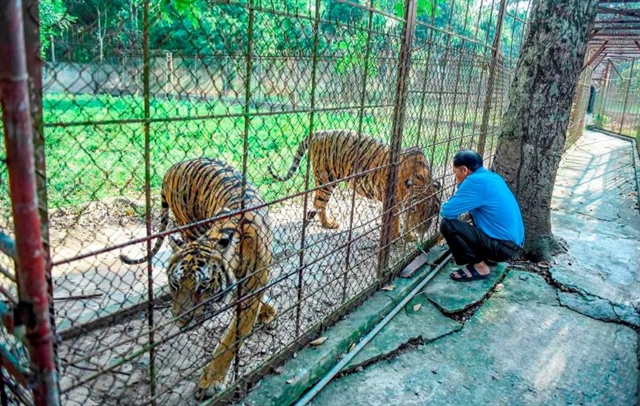 Environment
Environment

 |
| The tigers are raised in the farm of Nguyễn Mậu Chiến's family in Xuân Tín Commune of Thanh Hoá Province. Photo laodong.vn |
HÀ NỘI — The procedure of transferring a herd of tigers that was raised by a family in Thanh Hoá Province to Hà Nội Zoo for care and management has been finalised by the Thanh Hóa Provincial Forest Protection Department and the Ministry of Agriculture and Environment, reported Vnexpress.
The farm owner and the authorities have agreed on the policy and transfer process, said Đàm Văn Hùng, head of the Thanh Hóa Provincial Forest Protection Department.
However, more time is needed to complete the legal procedures for establishing State ownership of the animals and to ensure safety during the capture and transport of the tigers to their new facility, Hùng said.
According to the Department, in 2007, Nguyễn Mậu Chiến’s family in Xuân Tín Commune bought ten tiger cubs, each weighing around 7kg, from an unidentified person who had transported them from Laos to Việt Nam.
He was fined VNĐ30 million (US$1,180) but was allowed to continue caring for the tigers. In 2008, he bought five more tigers and was fined another VNĐ30 million.
Initially, the tigers were kept in small cages in his farm that is located in a residential area posing risks to safety, hygiene, and noise pollution from frequent roaring during mating season. Then, the family later rented land about 2.5km away in the Cồn Tàu Voi field for a new enclosure.
During the care process, six tigers have died since 2007 due to pneumonia and infected bite wounds from fighting, leaving nine remaining — three females and six males — weighing on average 180kg, with the largest nearing 300kg.
A serious incident occurred in May 2017, when a seventh-grade student climbed a power pole near the tiger enclosure to tease the animals and was attacked, sustaining injuries.
The current tiger farm spans 4,000sq. m, surrounded by 4.5m-high concrete walls reinforced with wire mesh.
In May 2017, the farm’s licence for breeding and maintaining tigers expired.
Although Chiến repeatedly requested an extension, authorities did not approve it.
Under the 2008 Biodiversity Law and Decree 160/2013, the facility “does not meet the conditions to be recognised as a biodiversity conservation centre.”
The family was allowed to continue feeding and caring for the tigers but prohibited from altering the facilities, selling, transporting, or slaughtering the animals.
For many years, both Government agencies and the Chiến family struggled to find a viable management solution.
The tigers consume about 100kg of food daily, and maintenance costs for cages, equipment, staff, and veterinary care amount to hundreds of millions of Vietnamese đồng per year — all paid by the family, which says it has become “exhausted and financially drained.”
Local forest rangers and authorities have also faced difficulties, having to assign teams to monitor the facility regularly without receiving funding for this task.
According to the department, in previous years when the licence expired, authorities encouraged the family to transfer the tigers to wildlife rescue centres. The family requested reimbursement for the years of feeding and facility maintenance.
In response, the Thanh Hóa People’s Committee instructed the provincial Department of Agriculture and Environment to contact eleven qualified wildlife rescue centres and zoos across the country.
However, most refused to accept the tigers, citing insufficient capacity. Some centres said they might consider accepting them only if the family “voluntarily donated the tigers without any compensation or support.”
At a meeting in mid-September, Chiến agreed to unconditionally transfer all nine tigers to any qualified unit or centre that meets the legal requirements and waived any compensation requests.
Hà Nội Zoo has been selected to take over the herd. VNS